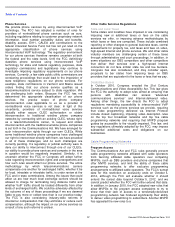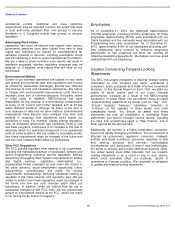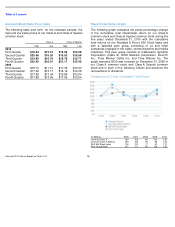Comcast 2010 Annual Report Download - page 30
Download and view the complete annual report
Please find page 30 of the 2010 Comcast annual report below. You can navigate through the pages in the report by either clicking on the pages listed below, or by using the keyword search tool below to find specific information within the annual report.
Table of Contents
25
Comcast 2010 Annual Report on Form 10-
K
Moreover, the use of certain types of technology and
equipment may provide our competitors with a competitive
advantage. For example, in some cases, phone companies
are using IP technology to provide video services in
substantial portions of their service areas, and wireless
Internet technologies continue to evolve. We expect other
advances in communications technology, as well as changes
in the marketplace, to occur in the future. If we choose
technology or equipment that is not as effective, cost-efficient
or attractive to customers as that employed by our
competitors, if we fail to employ technologies desired by our
customers before our competitors do so or if we fail to
execute effectively on our technology initiatives, our business
and results of operations could be adversely affected.
New technologies also are affecting consumer behavior in
ways that may have a negative impact on revenue for our
programming content. For example, the increased availability
of DVRs and video programming on the Internet, as well as
increased access to various media through mobile devices,
have the potential to reduce the viewing of our content
through traditional distribution outlets. Some of these new
technologies also give consumers greater flexibility to watch
programming on a time-delayed or on-demand basis or to
fast-forward or skip advertisements within our programming,
which may adversely impact the advertising revenue we
receive. Delayed viewing and advertising skipping have the
potential to become more common as the penetration of
DVRs increases and content becomes increasingly available
via Internet sources. Changes in technology, distribution
platforms and consumer behavior could have an adverse
effect on our businesses and results of operations.
Programming expenses for our video services are
increasing, which could adversely affect our future
results of operations.
We expect programming expenses for our video services to
continue to be our largest single expense item in the
foreseeable future. The MVPD industry has continued to
experience an increase in the cost of programming,
especially sports programming. In addition, as we add
programming to our video services or distribute existing
programming to more of our customers, we incur increased
programming expenses. We also expect to be subject to
increasing demands, including demands for cash payments
and other concessions, by broadcasters in exchange for their
required consent for the retransmission of broadcast
programming to our customers. If we are unable to raise our
customers’ rates or offset such programming cost increases
through the sale of additional services, the increasing cost of
programming could have an adverse impact on our results of
operations. Moreover, as our programming contracts and
retransmission consents with programming providers expire,
there can be no assurance that they will be renewed on
acceptable terms or that they will be renewed at all, in which
case we may be unable to provide such programming as part
of our video services
and our business and results of operations could be
adversely affected.
As a result of the NBCUniversal transaction, our
businesses are subject to the conditions set forth in the
NBCUniversal Order and the NBCUniversal Consent
Decree, and there can be no assurance that these
conditions will not have an adverse effect on our
businesses and results of operations.
In connection with the NBCUniversal transaction, the
NBCUniversal Order and the NBCUniversal Consent Decree
incorporated numerous commitments and voluntary
conditions made by the parties and imposed numerous
conditions on our businesses relating to the treatment of
competitors and other matters. Among other things, (i) we are
required to make certain of our cable, broadcast and film
programming available to bona fide online video distributors
under certain conditions, and they may invoke commercial
arbitration to determine what programming must be made
available and the price, terms and conditions that apply;
(ii) multichannel video providers may invoke commercial
arbitration to determine the price, terms and conditions for
access to our broadcast stations, cable networks and
regional sports networks; (iii) we are prohibited from
discriminating against cable programming networks on the
basis of their non-affiliation in the selection, terms or
conditions for carriage, under a standard that is comparable
to existing law; (iv) we must comply with the FCC’s open
Internet rules regardless of whether these rules are
invalidated in court or otherwise rescinded, and those rules
will apply to any set
-top box we provide that enables a
customer to receive high-speed Internet services; (v) we
must satisfy various other conditions relating to our high-
speed Internet services, including deploying broadband to
certain unserved areas, implementing a program to improve
high-speed Internet adoption among lower-income
households, offering all our customers a “stand-alone” high-
speed Internet service, and maintaining a high-speed Internet
service of at least 12 megabits per second across most of our
footprint; and (vi) we must renew our distribution agreement
with Hulu if the two other broadcast network owners of Hulu
also renew their agreements, and we must relinquish all
voting rights and our board seat in Hulu. These and other
conditions and commitments relating to the NBCUniversal
transaction are of varying duration, ranging from three to
seven years. Although we cannot predict how the conditions
will be administered or what effects they will have on our
businesses, we do not expect them to have a material
adverse effect on our business or results of operations. There
can be no assurance, however, that there will not be any
legal challenges to the NBCUniversal Consent Decree.
We are subject to regulation by federal, state, local and
foreign authorities, which may impose additional costs
and restrictions on our businesses.
Federal, state and local governments extensively regulate the
video services industry and may increase the regulation of
the Internet service and VoIP digital phone service industries.
We expect that
























